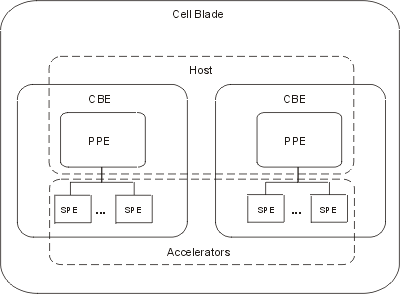The Data Communication and Synchronization (DaCS) library provides a set
of services which ease the development of applications and application frameworks
in a heterogeneous multi-tiered system (for example a hierarchical memory
system). The DaCS services are implemented as a set of APIs providing an
architecturally neutral layer for application developers on a variety of multi-core
systems. One of the key abstractions that further differentiates DaCS from
other programming frameworks is a hierarchical topology of processing elements,
each referred to as a DaCS Element (DE). Within the hierarchy each
DE can serve one or both of the following roles:
- A general purpose processing element, acting as a supervisor, control or master processor. This type of element usually runs a full operating system and manages jobs running on other DEs. This is referred to as a Host Element (HE).
- A general or special purpose processing element running tasks assigned by an HE. This is referred to as an Accelerator Element (AE).
The DaCS services provide the functionality needed to perform these roles and can be divided into the following categories:
- Resource reservation
- The resource reservation services allow an HE to reserve AEs below itself in the hierarchy. The APIs abstract the specifics of the reservation system (O/S, middleware, etc.) to allocate resources for an HE. Once reserved, the AEs can be used by the HE to execute tasks for accelerated applications.
- Process management
- The process management services provide the means for an HE to execute and manage accelerated applications on AEs, including, but not limited to, remote process launch, and remote error notification.
- Group management
- The group management services provide the means to designate dynamic groups of processes for participation in collective operations. In SDK 3.0 this is limited to process execution synchronization (barrier).
- Remote memory
- The remote memory services provide the means to create, share, transfer data to, and transfer data from a remote memory segment. The data transfers are performed using a one-sided put/get remote direct memory access (rDMA) model. These services also provide the ability to scatter/gather lists of data, and provide optional enforcement of ordering for the data transfers.
- Message passing
- The message passing services provide the means for passing messages asynchronously, using a two-sided send/receive model. Messages are passed point-to-point from one process to another.
- Mailboxes
- The mailbox services provide a simple interface for synchronous transfer of small (32-bit) messages from one process to another.
- Process Synchronization
- The process synchronization services provide the means to coordinate or synchronize process execution. In SDK 3.0 this is limited to the barrier synchronization primitive.
- Data Synchronization
- The data synchronization services provide the means to synchronize and serialize data access. These include management of wait identifiers for synchronizing data transfers, as well as mutex primitives for data serialization.
- Error Handling
- The error handling services enable the user to register error handlers and gather error information.
